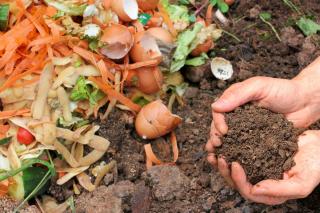Compost Program

At-Home Compost Bin Sale
Many community members compost in their own yards, and if you’d like to start, consider taking advantage of the Public Works current at-home compost bin sale. From now until May 10, Wakefield’s Public Works Department is offering residents at-home composting bins from Earth Machine for $55. The Earth Machine has an 80-gallon capacity, is BPA free, features a twist-locking lid, and is designed with a harvest door for easy compost removal. View the manufacturer's full description and specifications.
Stop by the Public Works office in Town Hall to place your order. Pick up will be Thursday, May 23, from 5 to 7 p.m. at the Wakefield Public Works Facility (35 North Avenue). Limited quantities available, so order yours today!
Curbside Pickup Program
- Weekly pickups: $74.99/6 months or $13.99/month
- Every-other-week pickups: $55.99/6 months & $10.99/month
In addition to food waste, including egg shells, coffee grounds, and meat bones, the compost program accepts items like toothpicks, popsicle sticks, houseplants and flowers, paper towels, and cooking oil. Read the full list of compostable items.
Learn more about the program: read the frequently asked questions and enroll today!
About Composting
Composting is a process that turns organic materials like food, leaves, and yard waste into soil enrichment. Known as "black gold" to gardeners, compost replenishes nutrients in the soil, helps it retain moisture, makes the soil easy to work, and helps plants resist disease. Composting can also help reduce methane production at landfills and have other environmental benefits. Read about the benefits of composting and how to do it at home.
- According to the MassDEP, organic waste makes up nearly 25 percent of the waste stream, which translates to over 1 million tons of organic waste in Massachusetts per year. Backyard composting is a great way to divert materials from the waste stream and also provide residents with an alternative to yard-waste collection.
- According to EPA estimates, composting diverts almost half a pound of food waste per person per day from the waste steam. For a family of four, that translates to over 600 pounds a year.

